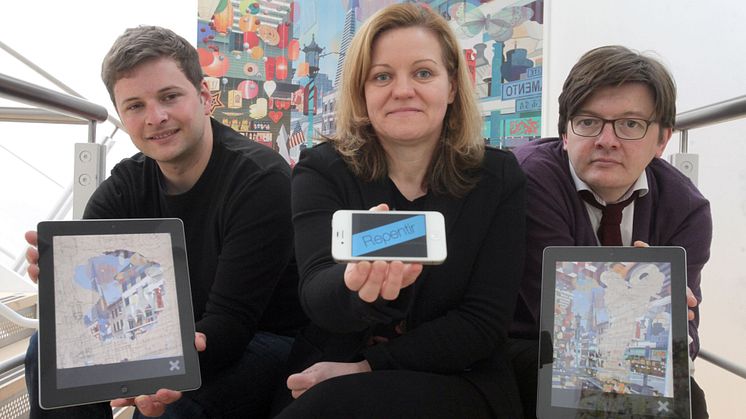
Press release -
Northumbria projects receive share of £11m digital data research funding
Recent media reports about the use and exploitation of personal data have increased public awareness of the benefits and drawbacks of sharing information online.
Now two projects from Northumbria University are to receive a share of £11m of research funding to further understanding of Trust, Identity, Privacy and Security (TIPS) issues in the Digital Economy.
The projects are among 11 across the UK selected by the Engineering and Physical Sciences Research Council (EPSRC) which aim to address the challenges experienced by those who use and interact with digital data, and those giving others access to their data online.
One of the projects selected to receive funding is entitled ‘INTUIT: Interaction Design for Trusted Sharing of Personal Health Data to Live Well with HIV’, led by Dr Abigail Durrant, Associate Professor in the School of Design. The academic team involved is highly interdisciplinary, including Professor Lynne Coventry and Dr Elizabeth Sillence in the Department of Psychology at Northumbria, Dr Shema Tariq, at University College London’s Institute for Global Health; Dr Jon Bird, in the Department of Computer Science, University of Bristol; Dr Simone Stumpf, at the Centre for Human Computer Interaction Design, City, University of London; and Dr Ewa Luger in Design Informatics at University of Edinburgh.
The project aims to identify and address fundamental TIPS challenges faced by those living with stigmatised long term conditions, such as HIV, in managing their health and interacting with care services, peer support networks, and private organisations.
In close collaboration with partners, including representatives from patients groups, leading charities, companies and national policy organisations, the project team will design and evaluate new online tools to provide people with stigmatising long term conditions more opportunity and choice for managing how they share data they have created themselves with other people.
Core non-academic partners include Public Health England; National Aids Trust; Central North West London NHS Foundation Trust; Newcastle upon Tyne Hospitals NHS Foundation Trust; Microsoft Research; Yoti; experts in HIV medicine, health psychology, medical informatics; and HIV advocacy groups. A researcher employed by The Terrence Higgins Trust will conduct studies on the project, and representatives from NHS Digital and INTEROPen will sit, alongside our other partners, on a Strategic Advisory Board to ensure that the work is fundamentally ‘co-created’ by all the project’s stakeholders.
Dr Durrant, a design researcher specialising in the field of Human Computer Interaction, said: “More people are living and ageing well with long term health conditions, placing increasing pressure on healthcare services to provide high-quality care to an ageing population. Promoting self-management is seen as key in delivering high-quality and cost-effective care.
“One example of an approach to self-management is the capture of personal data by patients about their condition, in order to share with healthcare providers and other organisations. These “patient-generated data” may offer important insights into the management of many long term conditions. However, there is a pressing need to understand the opportunities and challenges of such data interactions for improving personalised care.
“A key concern that we address in the project, is how an individual’s personal data about their health and lifestyle may be subjected to potential stigma or discrimination, with implications for their digital identity management.”
“Our aim is to understand the significant social challenges for self-managing HIV and other potentially stigmatising long term conditions, to identify the associated ethical issues, and to deliver innovative prototypes and guidelines that open up new strategic directions for the inclusive design of digital healthcare technologies.”
The second Northumbria project to receive funding is the Cumulative Revelations of Personal Data project, led at Northumbria by Dr Jo Briggs, Associate Professor in Interaction Design, also in the School of Design at Northumbria.
The research will explore how small, apparently innocuous pieces of personal information that are shared online can collectively pose significant risks to personal reputation, as well as employers’ operation security.
These snippets of information can be shared intentionally by an individual, generated from data shared about an individual by others, from recognition and location identification software, and from cross-authentication practices (e.g. signing into AirBnB via Facebook). Brought together, these data can provide unintended insights to others into an individual's personal habits, work patterns, personality, emotion, and social influence.
Working alongside the Royal Bank of Scotland, UK security agencies, GOScience, Bristows LLB and the Centre for Research and Evidence on Security Threats, the project will develop a prototype software tool to map out a portrait of a user’s digital footprint. This will then be reflected back to them, allowing them to understand how their personal data accumulates and the vulnerabilities and risks this creates.
Dr Briggs said: “Much research concentrates on the security of systems used by businesses and employers when a significant security risk is the ‘human factor’. Less well explored is the potential consequences of cumulative disclosure and associated consequences.”
“Cumulative Revelations, will investigate the digital footprint that people create through their everyday digital interactions. We will be looking at how we can increase people’s awareness of their digital trail by visually representing and communicating this, to raise awareness and empower individuals to better recognise the potential consequences of cumulative disclosure.”
The Cumulative Revelations of Personal Data project is led by Wendy Moncur, Interdisciplinary Professor of Digital Living at the University of Dundee and also involves Dr Leif Azzopardi, Chancellor's Fellow within the Department of Computer and Information Sciences at the University of Strathclyde and Burkhard Schafer, Professor of Computational Legal Theory at the University of Edinburgh.
Both Dr Durrant and Dr Briggs have a long-standing interest in researching digital identities. In the previous EPSRC ‘Charting the Digital Lifespan’ project, Dr Durrant studied how individuals manage their online identities as they experience major life transitions, including becoming a parent for the first time and retiring from work. Cumulative Revelations meanwhile builds on another EPSRC project, TAPESTRY, in which Dr Briggs is contributing to research which aims to investigate, develop and demonstrate new ways to enable people, businesses and services to connect safely online, exploiting the complex “tapestry” of multi-modal signals woven by their everyday digital interactions.
One of the focuses of the EPSRC funding is around the use of interdisciplinary research. Academics specialising in technological, economic, cultural, social, legal, ethical, design, behavioural and political disciplines have been encouraged to work together to come up with innovative new approaches to the issue of TIPS in the Digital Economy.
Both of Northumbria’s projects are based within the University’s School of Design, which has a strong reputation for interdisciplinary and cross-sectoral collaboration, with researchers regularly joining forces with academic colleagues from other disciplines and institutions, as well as with representatives from industry, the public sector, and the community.
Dr Durrant said: “It is great news to receive funding for highly interdisciplinary research with Design playing a central, leading role. At Northumbria School of Design we are continuing to demonstrate the value of Research-through-Design for tackling complex societal challenges, and for inspiring new, alternative possibilities for living, and for understanding the world and our relationships to it.”
The TIPS call was launched by the Research Councils Digital Economy Theme. Digital Economy Theme Lead Dr John Baird said: “The rapid digital technological changes that have already happened are having profound effects on the way people live, individually and collectively.
“The advances in the interconnectedness of devices, data and people present both opportunities and challenges. Recent news items around how personal data can be obtained and used highlights the need for research that can understand the complexities socio-technical relationships while also safeguarding the integrity and usefulness of data.”
Find out more about design research at Northumbria University by visiting https://www.northumbria.ac.uk/research/changing-challenging-world/ideate/
Topics
Categories
Northumbria is a research-rich, business-focused, professional university with a global reputation for academic excellence. To find out more about our courses go to www.northumbria.ac.uk
If you have a media enquiry please contact our Media and Communications team at media.communications@northumbria.ac.uk or call 0191 227 4604.










